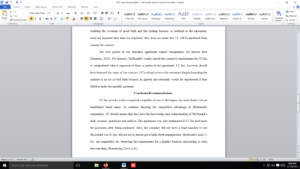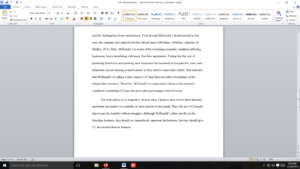Case Study of the McDonald’s Corporation and J.C
Action Items
- Prepare a case study that requires critical thinking. The case study should include related questions and guiding answers.
- J.C., Inc., had a franchise agreement with McDonald’s Corporation to operate McDonald’s restaurants in Lancaster, Ohio. The agreement required J.C. to make monthly payments to McDonald’s of certain percentages of the gross sales. If any payment was more than 30 days late, McDonald’s had the right to terminate the franchise. The agreement also stated that even if McDonald’s accepted a late payment, that would not “constitute a waiver of any subsequent breach.”
Submission Instructions
Requirements: 500-1000
Answer preview
J.C Inc is lucky to have acquired a franchise of one of the largest fast food chains with an established brand name. To continue enjoying the competitive advantage of McDonald’s corporation, J.C should ensure that they have the knowledge and understanding of McDonald’s daily business operations and policies. The agreement was only terminated if J.C Inc had made the payments after being pardoned. Also, the company did not have a legal mandate to sue McDonald’s as JC Inc. did not act in utmost good faith. Both organizations, McDonald’s and J.C Inc, are responsible for observing the requirements for a healthy business relationship to exist between them (Franchising Laws, n.d.).
[641 Words]

Case Study of the McDonald’s Corporation and J.C


